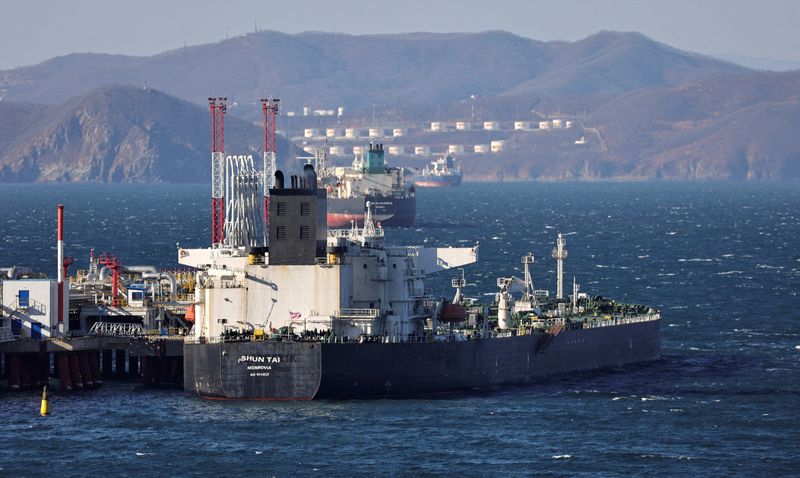By Timothy Gardner and David Lawder
WASHINGTON (Reuters) - Western powers' leverage over Russia has increased with their $60-a-barrel price cap on Russian crude oil, and any adjustments to the limit will consider a range of factors from Russian and global economic conditions to oil markets, a U.S. Treasury official told Reuters on Tuesday.
The price cap was imposed on Monday by the G7 industrial democracies and Australia at a level above the current price for Urals crude from Russia, the world's second largest oil exporter.
The cap aims to both cut Russian revenues from oil price spikes caused by its war on Ukraine, and ensure that Russian oil continues to flow to buyers including China and India, keeping global market prices under control.
The $60 limit on Russia's seaborne oil exports is to be reviewed every two months, and while the G7 is slated to start reviewing the level in mid-January, the Treasury official said there was no precise date on when the price cap level would be adjusted.
The official added that G7 countries and Australia would be busy in coming weeks determining two more price cap levels on Russian refined oil products slated to be in place by Feb. 5.
"I think the point is that we have all the leverage and all the control now that we've been able to set the ceiling at $60," the official said. "Any adjustments will be in the interest of the G7 and will be in the interest in Ukraine, it will be in the interest of the world economy and will not be in the interest of Russia," the official said.
Russian Deputy Prime Minister Alexander Novak has said the cap was a "gross interference" and that Russia was working on mechanisms to prohibit its use.
The official did not detail what was meant by leverage, though it was apparently a reference to Treasury's belief that the cap puts Russia in a bind. Treasury is "skeptical" that Russia would be able to sell all of its oil exports above the price cap to countries including India and China, the official said.
In separate remarks, Treasury Assistant Secretary for Terrorist Financing Elizabeth Rosenberg, said that the policy was specifically designed to allow India and China to continue purchasing Russian crude, but at deeper discounts.
Moscow may refuse to sell oil to countries observing the price cap, but this "would force them to shut in their oil, denying them revenue and potentially taxing and damaging their medium- to long-term drilling, refining, and storage infrastructure," Rosenberg said at an American Conference Institute sanctions conference in Washington.
"In any event, we will continue pursuing our overarching policy goal: to cut into Russia’s energy revenues and to keep

Russian oil flowing in a stable global market," Rosenberg added.
Analysts say that as the oil price cap plan evolved, its emphasis shifted from a mechanism to squeeze Russia's revenues, to one that ensures ample oil supply and locks in market discounts.